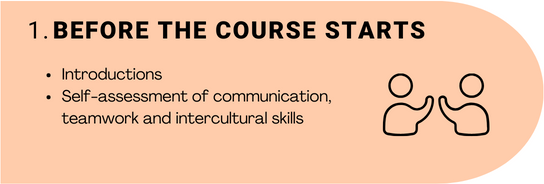Course information




Study the document before designing your communication plan.
Download this file, complete it and submit it together with your team communication plan.
Submit your communication plan and the team contract in one file.
Please study this document before producing your first learning journal entry.
Please click on this link to complete the beginning of course questionnaire.

During the course, you will be discussing various aspects of sustainability. The terms included in this glossary will probably be needed.
You can study the glossary using the Quizlet flashcards in this link.



Consider your strengths and potential weaknesses when it comes to negotiation skills. What comes naturally to you and what will you need to pay special attention to in order to help your team reach a decision everyone is happy with?
Rank your own skills using the statements in the Menti in this link.
Do this short quiz to make sure that you know how to give constructive and useful feedback.


This is the doodle link where you can schedule a 1:1 interview. It is going to be a friendly chat on Teams, max. 30mn and we just want to know a bit more about how you lived the course. Thank you for registering for this :-)